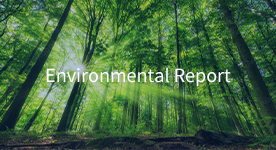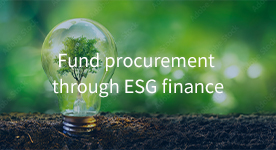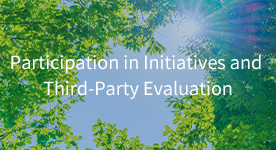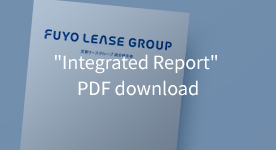The Fuyo Lease Group's Strategy for Decarbonization
Gravity of climate change has deepened in conjunction with the increase in greenhouse gases and is a global issue. Countries have been moving ahead on initiatives for decarbonization against the backdrop of the Paris Agreement, the post-2020 international framework.
Addressing climate change and decarbonization is an important business opportunity for the Group, which focuses on and has expertise in businesses related to renewable energy, and is a core area of CSV, where it can simultaneously achieve a high level of realizing social value and corporate value. In the medium-term management plan, we set contributing to the realization of decarbonized society as an important issue (materiality), and made a declaration to reduce CO₂ emissions through business activities.
The Fuyo Lease Group in engaged in initiatives to ease the impact of climate change and at the same time to grow business through a strategy based on the dual wheels of decarbonization of the Group as a form of risk reduction and decarbonization of customers and society as a business opportunity.

In 2019, we expressed support for the recommendations of the Task Force on Climate-Related Financial Disclosures (TCFD) and are disclosing information based on the TCFD recommendations. Please refer to "Information disclosure based on the TCFD recommendations" for on how we conducted a scenario analysis to identify risks and opportunities and set indicators and targets to reduce risks and capture opportunities, etc.
Decarbonization of the Group
To reduce the volume of greenhouse gases emitted, we decided that we needed to carry out initiatives voluntarily, and in 2018 became the first general lease company in Japan to participate in RE100 and declared in 2021 that we could achieve carbon neutrality in by 2030.
RE100 is an international initiative in which members aim to switch 100% of the energy used in their business operations to electricity from renewable sources. We have set medium- to long-term targets of achieving RE100 and becoming carbon neutral (for Scope 1 and 2 emissions) by 2030.

Use of renewable energy generated inhouse
Since fiscal 2021, in addition to switching all of the electric power used at the Group's head office building to RE100-compliant electricity, we have also been encouraging business locations in Japan and overseas to use renewable energy. In fiscal 2024, renewable electricity was introduced at some domestic locations and some energy consumption was offset using non-fossil fuel certificates. As a result, the percentage of electricity derived from renewable energy amounted to 88% of the entire Group's consumption.
Initiatives for more efficient energy use
Each business site within the Group is advancing energy-saving and energy efficiency initiatives. Specific efforts include setting air conditioning systems to appropriate temperatures, encouraging energy saving measures, and switching to high-efficiency lighting. We are also working to reduce the amount of fuel consumed by company cars by promoting safe, environmentally friendly driving techniques and raising awareness among employees. In fiscal 2024, six electric vehicles (EV) were introduced as company vehicles as part of efforts to reduce the volume of fossil fuel use.
Total CO₂ Emissions (Scope 1, 2)*1 *2 *3
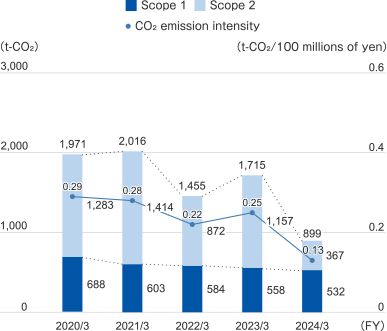
Total Energy Consumption*2 *3 *4
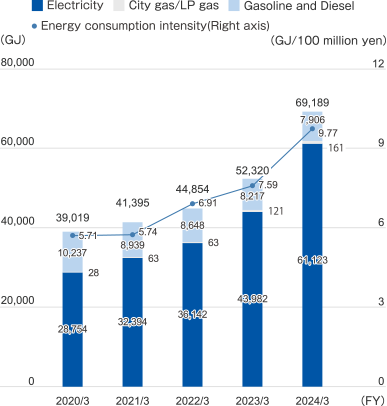
Electricity Consumption*2 *3
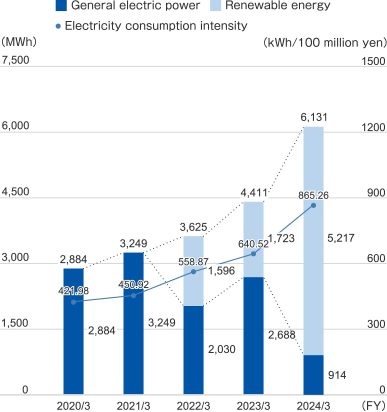
Total Gasoline and Diesel Consumed by Company Vehicles*2 *5
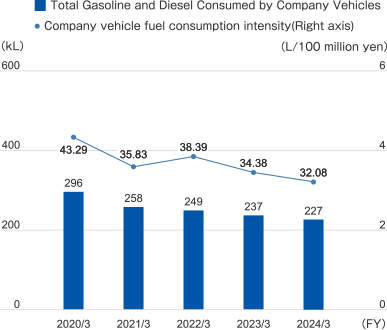
-
*1CO₂ emissions are calculated using the emission coefficient specified in the Ministerial Ordinance on Calculation of Greenhouse Gas Emissions Emitted by Specified Emitters. (Calculations concerning domestic electric power use the annual adjusted emission coefficients for general power transmission and distribution businesses that supply power in the regions where the offices to which the calculations apply operate. Calculations concerning overseas electric power use the emission coefficients of the specific country published by the International Energy Agency [IEA]) However, Fuyo General Lease and companies of the Fuyo Lease Group are not considered to be specified emitters.
-
*2The statistics are collected from all domestic offices of Fuyo General Lease Co., Ltd., Fuyo Auto Lease Co., Ltd., FGL GROUP Business Service Co., Ltd., FGL GROUP Management Service Co., Ltd., FGL Circular Network Co., Ltd., FGL LeaseUp Business Service Co., Ltd., Aqua Art Co., Ltd., FGL Techno-Solutions Co., Ltd., Sharp Finance Corporation, Accretive Co., Ltd., INVOICE INC., FUJITA Co., Ltd., Fuyo Outsourcing & Consulting Inc., YAMATO LEASE CO., LTD., WorkVision Corporation, Human Centrix Co., Ltd., CB Holdings Inc., and WAKOPALLET CO., LTD., and solar power plant SPCs that are consolidated subsidiaries, as well as overseas affiliates and subsidiaries including Fuyo General Lease (USA) Inc., Fuyo General Lease (China) Co., Ltd., Fuyo General Lease (HK) Limited, Fuyo General Lease (Asia) Pte. Ltd., Fuyo General Lease (Taiwan) Co., Ltd., Fuyo General Lease (Thailand) Co., Ltd., FGL Aircraft Ireland Limited, Aircraft Leasing and Management Limited, FGL Aircraft USA Inc., Pacific Rim Capital, Inc. and PLIC Corp., Ltd. For the Fuyo Lease Group companies, figures from before the figures began to be aggregated are not indicated. Additionally, solar power plant SPCs that are consolidated subsidiaries have been included in the scope of calculation of Scope 2 CO₂ emissions and electricity used as a result of the establishment of an aggregation framework since fiscal 2023.
-
*3Electricity usage has been estimated for some locations. The estimation method is based on multiplying the area of the site subject to estimation by the electricity consumption per area of the Fuyo Lease head office, the entire building of the site subject to estimation, or the head office of the site subject to estimation.
-
*4Energy consumption is calculated using unit heating values stipulated by the Act on Rationalizing Energy Use.
-
*5In addition to values shown in the graph, 555.25kg of hydrogen fuel were used.
Adapting to climate change
The Fuyo Lease Group is not only engaged in mitigation activities for climate change, but the Group is also carrying out adaption measures for it. We have a business contingency plan in place for responding to extreme weather, which includes measures taken to prepare for massive flooding that could occur at our business sites, or data centers, and we are working to minimize risks.
Decarbonization of Customers and Society
The Group is working to reduce CO₂ emissions through the installation and replacement of renewable energy and energy-saving equipment and devices for its customers, positioning this as an important contribution to reduction that the leasing business can make.
To achieve this goal, we are actively approaching and collaborating with stakeholders, including customers, to actively implement the initiatives outlined below with the aim of raising our ability to advance decarbonization. Additionally, we do not support any activities that deny climate change or violate climate change regulations.
Energy Conservation via Products and Services
We have partnered with energy-saving equipment manufacturers, construction companies, and companies in other various sectors to help customers save energy through the ESCO service and other programs. The ESCO service provides everything needed to improve energy efficiency, including technology, equipment, personnel, and funding, and achieves energy conservation without compromising a customer's current environment or convenience. As the ESCO service provider, we receive a portion of the actual energy cost savings generated through the service as compensation. In addition, we help our customers reduce costs and CO₂ emissions by introducing various energy saving solutions tailored to their energy usage. Examples of the solutions include energy-saving control and operational improvement for air-conditioning systems and LED lightings, and subsidized leasing.
Promotion of Renewable Energy
As climate change risks increase, the renewable energy market continues to grow with a focus on solar, wind, biomass, small and medium hydro, and geothermal power. Fuyo Lease contributes to the spread of renewable energy by providing customers with a variety of optimal power generation facility installation plans combined with various financing schemes. Our offerings include participation in large-scale power generation projects and green power supply (PPA) services, such as installing solar power generation systems on customers' facility roofs or idle land and directly supplying the generated green power to customers. All these are based on the expertise we have accumulated through our own power generation business.
At the same time, we are contributing to further expanding the introduction of renewable energy by forming business alliances with venture companies that have advanced renewable energy-related technologies, and supporting industrialization and commercialization.
Initiatives in the Renewable Energy Generation Business
The Fuyo Lease Group launched its renewable energy generation business in fiscal 2012, and now supplies green energy to local communities. Since fiscal 2021, we have primarily engaged in solar and wind power generation in Japan, while we are also participating in large-scale projects overseas, including in Europe and the United States. As a result, our renewable energy generation capacity in fiscal 2024 was 876 MW.
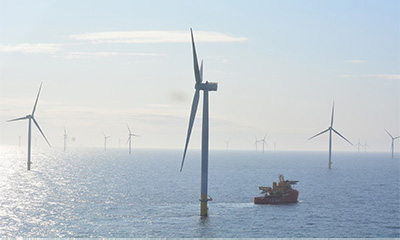
Hornsea One Offshore Wind Power Plant (U.K.)
Green Power Supplied (Output) / CO₂ emissions reduction contribution
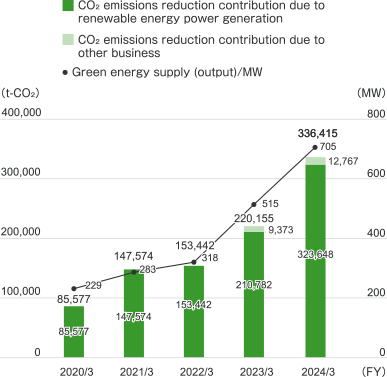
Promoting Renewable Energy-Related Infrastructure
We offer two programs that provide financial support to companies and organizations working toward decarbonization: the Fuyo 100% Renewable Electricity Declaration Support Program, and the Fuyo Zero Carbon City Support Program.
The Fuyo 100% Renewable Electricity Declaration Support Program is a preferential financing program for businesses and organizations that have joined RE100 and the Renewable Energy 100 Declaration RE Action. The program is aimed at encouraging the introduction of renewable energy and energy-efficient equipment.
The Fuyo Zero Carbon City Support Program is a donation-style finance program to support the decarbonization of municipalities that have declared to have zero carbon dioxide emissions by 2050 (zero carbon cities). This is an initiative where a donation equivalent to 0.2% of a lease contracted amount is donated to an organization that contributes to the promotion of zero carbon cities. It is conducted in collaboration with customers that have introduced equipment or machinery for decarbonization in municipalities that have declared themselves as zero carbon cities. The program has been used by many customers throughout Japan and was chosen by the Ministry of the Environment as a project of certified excellence in the 2023 ESG Leasing Promotion Project.
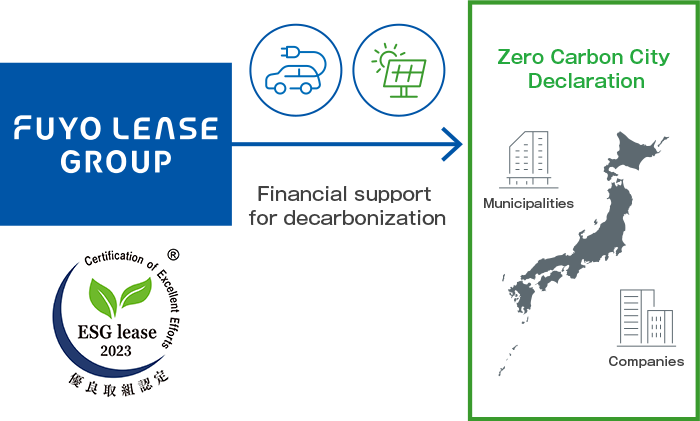
TOPICS
Support for Establishment of the Weather Attribution Center Japan Through Donation to the Atmosphere and Ocean Research Institute, The University of Tokyo
We made a donation to the Atmosphere and Ocean Research Institute of The University of Tokyo under the Fuyo Zero Carbon City Support Program. The donation was used to support the establishment of the Weather Attribution Center (WAC), which plays a role in rapidly quantifying the influence of humaninduced warming and other natural variations on extreme weather events in Japan and promptly disseminating such findings to society. Launched in May 2025, the WAC has begun conveying information with the aim of prompting action at all levels of society by enhancing understanding of climate change effects.
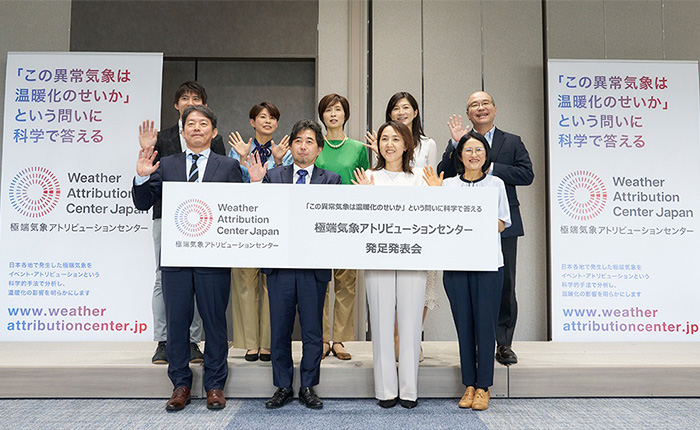 Ceremony for the launch of the Weather Attribution Center (WAC)
Ceremony for the launch of the Weather Attribution Center (WAC)
Providing Support for Investments in Renewable Energy-Related Technologies and Their Commercialization
In order to contribute to the further expansion of renewable energy introductions, we provide commercialization support to venture companies possessing cutting-edge renewable energy technologies through investments and business collaborations.
Major Support Results
| Investment Timing | Partner | Description |
|---|---|---|
| June 2018 | Exergy Power Systems | Development and manufacture of next-generation energy storage systems |
| Mar. 2019 | NExT-e Solutions | Provision of battery management systems that utilize advanced battery control technologies |
| Feb. 2020 | Girasol Energy | Development of IoT platforms for the maintenance and management of solar power facilities |
| Oct. 2020 | Tsubame BHB | Development manufacturing technology for distributed production of ammonia under low-temperature, low-pressure conditions |
| Oct. 2021 | i GRID SOLUTIONS | Engaged in energy management, Virtual Power Plant (VPP), and electric power supply businesses |




